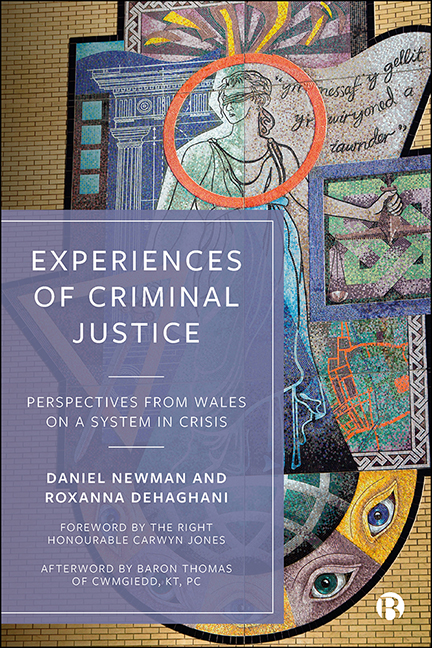Book contents
- Frontmatter
- Contents
- List of Figures and Tables
- Foreword
- Acknowledgements
- 1 Why Wales?
- 2 A System in Crisis
- 3 The People and Their Experiences
- 4 Criminal Justice in Its Place
- 5 Pressures of Practice
- 6 Criminal Justice Relationships
- 7 Navigating the Criminal Justice System
- 8 Doing Criminal Justice Differently
- Afterword
- References
- Index
4 - Criminal Justice in Its Place
Published online by Cambridge University Press: 15 September 2022
- Frontmatter
- Contents
- List of Figures and Tables
- Foreword
- Acknowledgements
- 1 Why Wales?
- 2 A System in Crisis
- 3 The People and Their Experiences
- 4 Criminal Justice in Its Place
- 5 Pressures of Practice
- 6 Criminal Justice Relationships
- 7 Navigating the Criminal Justice System
- 8 Doing Criminal Justice Differently
- Afterword
- References
- Index
Summary
Introduction
In the preceding chapter we examined the stories of those involved in the research, detailing how they came into the criminal justice system – whether as practitioners or as an accused or family member. This included drawing out key themes such as the impact of underfunding on criminal justice institutions and the role played by the accuseds’ level of previous contact with the criminal justice system. We build thereon in this chapter by focusing on the place – south Wales, two decades into the 21st century – adding a further layer of detail that is crucial to understanding the experiences of criminal justice examined in this book. Just as the stories of the participants are important in understanding the experiences that we relay and analyse, so too are the stories that emerge from considering the region in which our research took place.
Criminal justice research has largely neglected the issue of place as a core consideration (Newman, 2016a). This may sometimes be due to ethical requirements such as the assurance of anonymity, but it may also arise out of concerns regarding ‘case studies’ being discounted through the desire to demonstrate generalizability. Our work is informed by a legal geography approach, investigating the co-constitutive but uneasy relationship between people, place and law (Bennett and Layard, 2015). In this chapter – expanding on detail from Chapter 1 (outlining the case for Wales as a site of criminal justice study) and Chapter 2 (describing south Wales and charting some of the impacts of criminal justice cuts) – we focus on the region of south Wales. In doing so, we acknowledge the role of the spatial in shaping the impact of the law on people's lives. While certainly the discussion of experiences of criminal justice can inform broader debates at an England and Wales level, it is nevertheless important for debates to be grounded within the context from which they emerge. We have also attempted to pay attention to both space and time (see Braverman et al, 2014), focusing on criminal justice under austerity while also situating this within a distinct region. By adopting a place – space andtime – based approach, we ground the research within the communities under investigation (Newman, 2016a). Important to this are the local conditions and circumstances: the impact of austerity does not manifest equally across a jurisdiction.
- Type
- Chapter
- Information
- Experiences of Criminal JusticePerspectives from Wales on a System in Crisis, pp. 78 - 109Publisher: Bristol University PressPrint publication year: 2022

